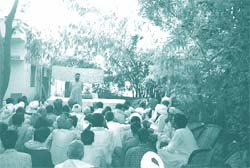Managing a crisis
 after having revived the Arvari rivulet through the sweat of their brow, the 70 villages in the rivulet's basin in Alwar district, Rajasthan, have gone one step ahead. They are taking proactive measures to deal with the third consecutive year of drought. This is being done through the Arvari Sansad, or the Arvari Parliament, which was formed in January 1999.
after having revived the Arvari rivulet through the sweat of their brow, the 70 villages in the rivulet's basin in Alwar district, Rajasthan, have gone one step ahead. They are taking proactive measures to deal with the third consecutive year of drought. This is being done through the Arvari Sansad, or the Arvari Parliament, which was formed in January 1999.
On October 2-3, 2000, the Arvari Parliament met in an emergency meeting in village Bhikampura to discuss the drought-like situation staring Rajasthan in the face and the measures required to mitigate the effects of consecutive monsoon failures. The Arvari Parliament was formed to manage the river and its waters after its flow became perennial in 1996. This was a result of the 70 villages building more than 200 johad s (earthen check dams that are based on age-old, time-tested principles of water management). The river had been reduced to a monsoonal drain for decades, while the region was reeling under chronic drought (see
Related Content
- Review of upper Yamuna river cleaning projects up to Delhi and river bed management in Delhi
- Moving back from the edge: changing the status quo for the most vulnerable and excluded in international climate action
- Water valuation and pricing in India: imperatives for sustainable water governance
- High cost of cheap water: the true value of water and freshwater ecosystems to people and planet
- Water dilemmas: the cascading impacts of water insecurity in a heating world
- World risk report 2023: focus:- diversity
